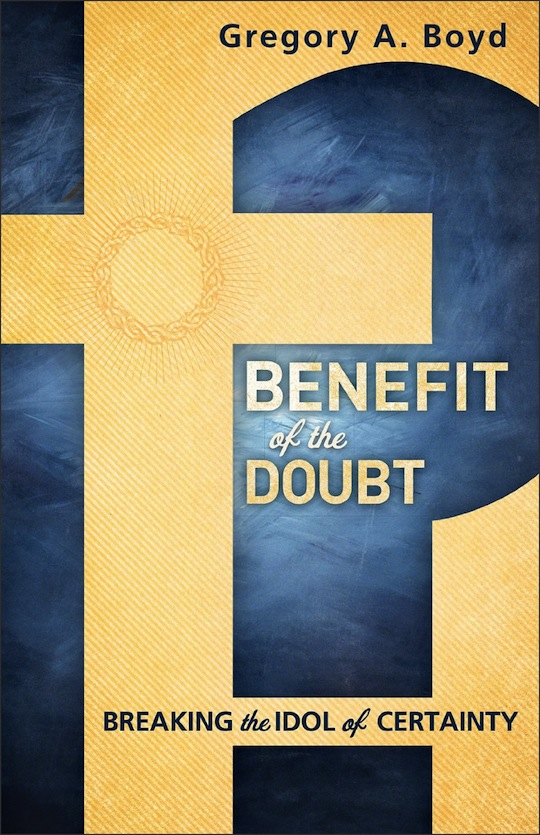We run our website the way we wished the whole internet worked: we provide high quality original content with no ads. We are funded solely by your direct support. Please consider supporting this project.

Benefit of the Doubt Is Here!
Benefit of the Doubt is finally here and you should definitely get yourself a copy! Frank Viola interviewed Greg about the book recently and you can read it over on Frank’s blog Beyond Evangelical. In fact, Frank is so enthusiastic about the book that he added it to his Best 100 Christian Books Ever Written list. Wow.
Also, for those of you who are waiting anxiously for Greg to complete Crucifixion of the Warrior God, you might be interested to know that there’s an entire chapter of Benefit of the Doubt dedicated to giving us a simplified idea of where he’s going with his cross-centered reading of all Scripture.
From the interview:
Whereas most Christians believe in Jesus because they believe in the Bible, inBenefit of the Doubt you advise people to believe in the Bible because they believe in Jesus. What do you mean by this, and why do you feel it is important?
Greg Boyd: The number one reason why young people today are abandoning the Christian faith and why other people can’t take the Christian faith seriously has to do with problems they have with the Bible. For example, as most freshmen who take a course in “The Bible as Literature” at a secular University learn, the historical accuracy of some biblical stories is questioned by many scholars, and its hard to deny that the Bible contains some apparent contradictions as well as some material that seems to fly in the face of modern science. In Benefit of the Doubt, I share my own experience of losing faith as a freshman at a University for these reasons.
I now see that this mass exodus from the Christian faith is as tragic as it is unnecessary, for I maintain that if we structured our faith the way the earliest Christians did, the many problems people have with the Bible would pose no threat to our confidence in Jesus being Lord and even to our confidence that the Bible is the inspired Word of God. The reason these problems destroy the faith of so many today is because evangelicals todaydon’t structure their faith the way they earliest Christians did.
Here’s what I mean. The earliest disciples didn’t believe in Jesus because their Scripture (the OT) proved to them that he was the Son of God. They were rather convinced by Jesus’ claims, his unique life of love, his distinctive authority, his unprecedented miracles, his self-sacrificial death, and especially his resurrection. Once they believed in Jesus, they then looked for him and found him in their scripture. But they never would have been convinced that Jesus was Lord had they started with scripture alone.
Unfortunately, most evangelicals today are taught to do the exact opposite. They base their faith in Jesus’ Lordship (as well as everything else) on their belief that the Bible is the inspired Word of God. This is unfortunate because this way of structuring our faith leverages everything on the supposed perfection of this book (hence all the clamoring over “the inerrancy” of the Bible), forcing the Bible to carry more weight than it was ever meant to carry. In this way of structuring faith, every single problem someone finds in scripture threatens to undermine their faith – and there are, quite honestly, a multitude of these potential threats.
As I flesh out in Benefit of the Doubt, I eventually came to the conclusion that the things about Jesus that convinced the earliest disciples that he was Lord continue to be compelling enough to convince open-minded people today that Jesus is Lord, and they do not presuppose the view that the Bible is the inspired Word of God. Once I was persuaded on the basis of historical, philosophical and personal arguments that Jesus was Lord, I was motivated to also embrace the Bible as God’s Word, for (among other things) this was clearly Jesus’ own view and it’s very hard to confess Jesus to be one’s Lord while correcting his theology, especially on such a fundamental matter. But notice, my reasons for believing in Scripture are now based entirely on my faith in Jesus, which is why my faith need not any longer be threatened by any historical inaccuracies or contradictions or scientific inaccuracies I may find in it.
Category: General
Tags: Benefit of the Doubt, Bible, Cruciform Theology, Doubt, Faith, Frank Viola, Greg Boyd, Interview, Jesus
Related Reading

Are the Gospels Historical Fiction?
Some scholars today argue that the stories recorded in the Gospels are actually intentional fabrication. In essence, they argue that Mark took Paul’s theology and robed the story of Jesus in a fictitious historical narrative. The other Gospels followed suit. The argument is clever and removes the difficulty of explaining how a legend of a…

Podcast: Where Does Forgiveness Fit in a Cruciform Theology?
Greg offers looks at forgiveness in a realm of natural consequences. http://traffic.libsyn.com/askgregboyd/Episode_0298.mp3

Sermons: Resurrection Principle
Is the resurrection of Jesus true? The entire Christian faith rests on if is or not. In this short sermon clip, Greg Boyd goes through a few historical proofs as to why this is true. It is important to remember Christ’s resurrection and the meaning, purpose and principle behind it. In the full sermon, Greg…

Podcast: If the Cross is the FULL Revelation of God, Why Do We Even Need All the Rest?
Greg discusses the summation of the Bible in the crucifixion. http://traffic.libsyn.com/askgregboyd/Episode_0285.mp3

Atonement: What is the Christus Victor View?
Most western Christians today understand the atonement as a sort of legal-transaction that took place between the Father and the Son that got humanity “off the hook.” The legal-transaction scenario goes something like this: God’s holiness demands that all sin be punished, which in turn requires that sinners go to eternal hell. The trouble is,…

Is the Bible a Legal Textbook?
Olga via Compfight Too much theology treats the Bible as if it were legal textbook. In the following except from Benefit of the Doubt, Greg addresses the problems when we approach theology and Scripture this way. Incidentally, if you like these excerpts we’ve been posting from Benefit of the Doubt, you’re not going to want to…
